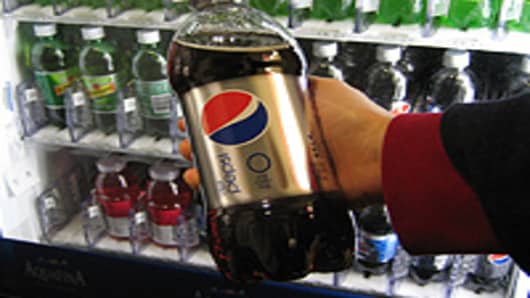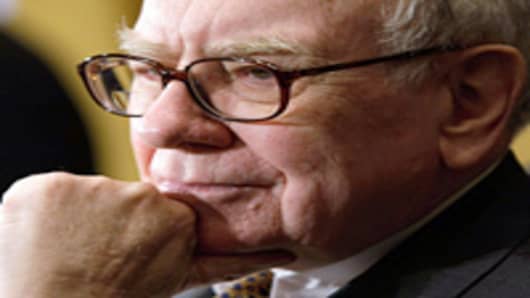The old model for soft drink manufacturers is a "a relic of the past," says PepsiCo Chairman and CEO Indra Nooyi.
"The beverage business in North America has changed substantially over the last decade or two," Nooyi said in an interview with CNBC, where she defended Pepsi's recent strategic moves in a discussion with billionaire investor Warren Buffett, who is the largest shareholder of Coca-Cola, Pepsi's key rival.
"It's not growing as much, and the nature of the business itself has gone from a few megabrands to a bunch of fragmented new products, non-carbonated versus just carbonated drinks," Nooyi said.
She stressed that growth is necessary to allow the industry's old model of having bottlers buy soft drink concentrate from companies like PepsiCo , which market the product, to also manufacturing and distributing it as well. Pepsi recently closed its acquisition of its two largest bottlers Pepsi Bottling Group and PepsiAmericas. Since the deal was announced last year, the company has said it needed to take this step to make its business react more nimbly to consumers' shifting tastes.
Last week, Nooyi received perhaps the biggest affirmation of the soundness of the strategy as rival Coca-Colaannounced plans to take a similar step. Coke plans to buy the North American operations of its largest bottler Coca-Cola Enterprises .
"I think the franchise system works as long as the market and the categories are growing," Nooyi explained. "When the market slows down — when the category growth rate slows down — the franchise system always runs into issues because there are two companies fighting over a very, very limited profit pool."
Buffett has said long-term he does not like being in the bottling business because it is a very capital-intensive business, but he understands why Coke is doing it at this time.
"The franchise operation works extremely well around the world," Buffett said, citing the growth Coke Femsa has seen in Mexico. "So it's not a system that needs fixing at all around the world."
However, at least on industry analyst sees Coke's recent decision as an intermediate step. Stifel Nicolaus analyst Mark Swartzberg expects the next step could be the potential acquisition of Coke Femsa, Coke's largest bottler in Mexico.
Separately, Nooyi said she expects that growth is slowing in Western and Eastern Europe as well, which means a consolidation of the soft drink business may need to occur there too.
Coke is not taking that step at this time. After Coke's deal, Coca-Cola Enterprises will operate solely in Europe.
Buffett also said he anticipates that there will be some issues integrating the bottling businesses into Coke and Pepsi.
However, Nooyi said she expects that the situation will go smoothly at PepsiCo, citing the background the company has in distribution with its Frito-Lay snacks businesses.
Coke or Pepsi?
In a playful exchange, Nooyi and Buffett also disagreed on that beverage goes best with Frito-Lay's Cheetos and Fritos snacks.
Buffett usually drinks a Cherry Coke, while Nooyi, naturally, said the snacks taste best with a Pepsi.
Nooyi also recalled that Buffett said he used to drink Pepsi when he was young boy, prompting Buffett to say his decision was purely economical. In the thirties, a 12-ounce Pepsi cost a nickel, while Coke only gave you half as much for the same cost.
"I would definitely say that at half the price, it — Pepsi was a good buy at that time, marked down 50 percent," Buffett said.
Nooyi replied, "Warren, let me assure you at any price Pepsi is a good product."
Consumer Environment Soft
Nooyi also said she remains "worried" about the American consumer over the next 12-18 months.
"I think the consumer environment is very, very soft," Nooyi said. "I think what we have is that people still don't have the confidence to spend money and they are waiting to see what happens before they open their wallets."
Nooyi expects this will remain the case as long as there are continuing concerns about job growth.
For more from Consumer Nation:




